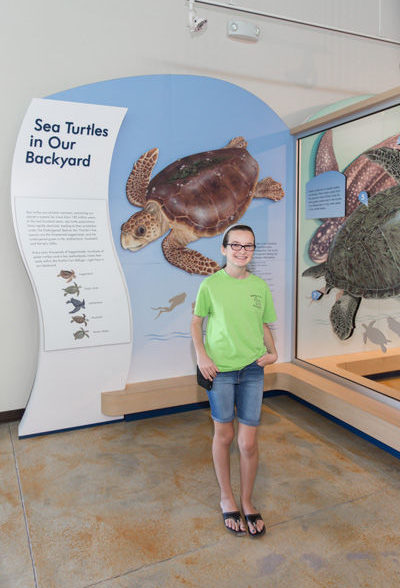
For more than half her young life, 12-year-old Cori McWilliams has been passionate about sea turtles, devoting countless girl-power hours toward protecting these magnificent creatures of the sea through her marine conservation efforts. In 2014, she founded the nonprofit organization Kids for the Sea in an effort to spark that same environmental enthusiasm in other young people.
Her introduction to sea turtles began at the Barrier Island Sanctuary Management and Education Center (aka the Barrier Island Center, or BIC), located at the Archie Carr National Wildlife Refuge, north of the Sebastian Inlet in south Melbourne Beach.
“My mom [Celeste McWilliams] took me here and I met Donna Lee Crawford,” says McWilliams, referencing the Sea Turtle Conservancy’s community stewardship coordinator.
“She is like the sea turtle guru of this place. She taught me all about sea turtles and I was just completely fascinated by them. They’re very unique creatures. They’re in danger now, so they may not be here for my children and their children. They’ve been here so long, and I was like, ‘I should do something to make them stay here.’ We don’t want the sea turtles to be like the dinosaurs; learning about them, but not having that first-hand experience.”
Eschewing the notion that she was too young to get involved, McWilliams started with simple tasks such as beach cleanups, before progressing to more advanced projects. She has since been recognized with numerous awards for her efforts, but that’s not what motivates her.
“Ever since I came here, sea turtles have been my passion because I love them. If you like something, then you should go and protect it. I find that everyone will protect what they love and they love what they understand.”
McWilliams has tied Kids for the Sea into the Stow It Don’t Throw It conservation effort founded by Sean Russell, in conjunction with the Mote Marine Laboratory in Sarasota.
“I met the guy who runs the project; he’s absolutely wonderful. It’s actually recycled tennis ball cans, and we refurbish them so that they’re trash holders. They can be dumped out and reused if you wash them. They’re great for the little micro plastics and fishing lines you find.”
Kids for the Sea volunteers have distributed roughly 600 of them at beach cleanups and to places such as the BIC, Environmental Learning Center and Keep Indian River Beautiful.
McWilliams volunteers with the BIC Sea Turtle Academy, teaching young elementary students about conservation, and helps out at the annual Tour de Turtles fundraiser. Every Friday from the beginning of June through the end of July, the height of the sea turtle nesting season, she scouted for guided sea turtle walks at the refuge, looking for loggerheads lumbering from the sea to lay their nests by the dune line.
Numbers have been impressive this year at Archie Carr, one of the most important sea turtle nesting grounds in the world. As of the end of August there were 20,376 loggerhead nests, 1,295 green sea turtle nests, 72 leatherback nests and one rare Kemp’s ridley nest.
McWilliams says green sea turtle nesting is cyclical, so they expected this year to be slow, but she remembers 2013, the record-breaking year which saw roughly 13,000 green sea turtle nests.
“For every one loggerhead, we’d get like 20 or 30 greens. That year was completely crazy. It really shows that all the conservation work that people have done is working.”
Once hatchlings begin leaving the nests, McWilliams volunteers with Kendra Cope, Indian River County sea turtle coordinator.
“If they see that a nest is completely erupted, they wait three days, just so any stragglers can get out,” says McWilliams, explaining that volunteers then count how many hatched and didn’t hatch, occasionally even discovering and releasing a live straggler.
McWilliams has obtained an open-water scuba certification and has more than two dozen dives under her belt. “It’s really neat to actually go in the water and really experience their world first-hand,” she says.
Now in seventh grade, she has enjoyed the freedom of being enrolled in the online Florida Virtual School, a fully-accredited, tuition-free K-12 public school, which she started as a sixth grader.
“It’s a set curriculum; unlike home schooling, it’s all laid out for you. You don’t have to buy any books or anything. It’s very unique and it’s also really flexible,” says McWilliams. “So if something came up and I had to go somewhere, I can just log off for a few hours, do whatever I need to do, and then I can just log back in and finish my school work for the day.”
Her advice to other young people is to follow their passions and try new things.
“The people that you’ll meet will affect you some way or another in ways that you never ever would have believed. If I hadn’t been talking to Donna Lee Crawford when I came here, who knows? I might have been one of those kids playing video games thinking, I want to do that but I can’t do that. And it’s not true. You never know where life will take you.”
To learn more, visit Kids for the Sea on Facebook.



